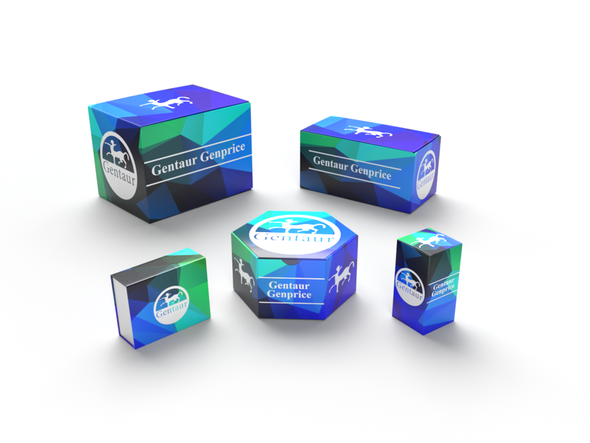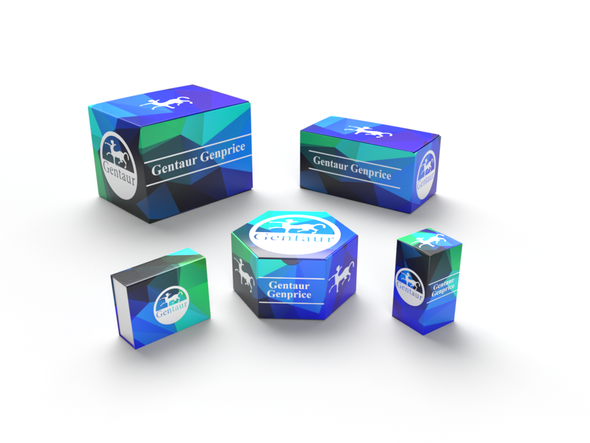Description
Mouse Anti-Human VEGFR1-14/Flt1-14 (peptide), soluble Antibody | 101-M29 | Gentaur UK, US & Europe Distribution
Species: Anti-Human
Host / biotech: Mouse
Comment: N/A
Label: N/A
Clone / Antibody feature: (#180F3B4)
Subcategory: Monoclonal Antibody
Category: Antibody
Synonyms: vascular endothelial growth factor receptor-1; FLT1; VEGF receptor 1;
Isotype: IgG1
Application: ELISA, WB
Detection Range: Western blotting: Use 1–10 µg/ml
Species Reactivity/Cross reactivity: Human
Antigen: uniquie C terminal peptide of sFlt1-14
Description: A human-specific splicing variant of vascular endothelial growth factor (VEGF) receptor 1 (Flt1) was discovered, producing a soluble receptor (designated sFlt1-14) that is qualitatively different from the previously described soluble receptor (sFlt1) and functioning as a potent VEGF inhibitor. sFlt1-14 is generated in a cell type-specific fashion, primarily in non-endothelial cells. Notably, in vascular smooth muscle cells, all Flt1 messenger RNA is converted to sFlt1-14, whereas endothelial cells of the same human vessel express sFlt1. sFlt1-14 expression by vascular smooth muscle cells is dynamically regulated as evidenced by its upregulation on coculture with endothelial cells or by direct exposure to VEGF. Increased production of soluble VEGF receptors during pregnancy is entirely attributable to induced expression of placental sFlt1-14 starting by the end of the first trimester. Expression is dramatically elevated in the placenta of women with preeclampsia, specifically induced in abnormal clusters of degenerative syncytiotrophoblasts known as syncytial knots, where it may undergo further messenger RNA editing. sFlt1-14 is the predominant VEGF-inhibiting protein produced by the preeclamptic placenta, accumulates in the circulation, and hence is capable of neutralizing VEGF in distant organs affected in preeclampsia. Together, these findings revealed a new natural VEGF inhibitor that has evolved in humans, possibly to protect non-endothelial cells from adverse VEGF signaling. Furthermore, the study uncovered the identity of a VEGF-blocking protein implicated in preeclampsia.
Purity Confirmation: N/A
Endotoxin: N/A
Formulation: lyophilized
Storage Handling Stability: The lyophilized antibody is stable for at least 2 years at -20°C. After sterile reconstitution the antibody is stable at 2-8°C for up to 6 months. Frozen aliquots are stable for at least 6 months when stored at -20°C. Addition of a carrier protein or 50% glycerol is recommended for frozen aliquots.
Reconstituation: Centrifuge vial prior to opening. Reconstitute in sterile water to a concentration of 0.1-1.0 mg/ml.
Molecular Weight: N/A
Lenght (aa): N/A
Protein Sequence: N/A
NCBI Gene ID: 2321


![Recombinant Human VEGFR1-14/Flt1-14, soluble Protein [Insect cells] Recombinant Human VEGFR1-14/Flt1-14, soluble Protein [Insect cells]](https://cdn11.bigcommerce.com/s-1rdwiq712m/images/stencil/590x590/products/527013/532849/gentaur-genprice__04902.1663435466__38299.1663436130__85458.1663587478.png?c=1)






![VEGFR1 Antibody [FLT1/658] VEGFR1 Antibody [FLT1/658]](https://cdn11.bigcommerce.com/s-1rdwiq712m/images/stencil/590x590/products/483418/489247/gentaur-genprice__26005.1661610467__29809.1661628092__75433.1661676199__77988.1661684280__64362.1661692443__02085.1662049603__45075.1662119302__91744.1662191540__21580.1662291419__50597.1663498710.png?c=1)
